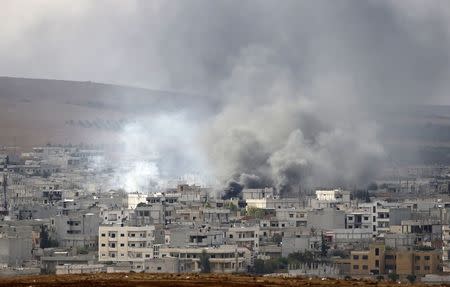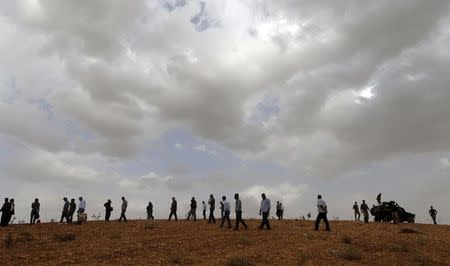Kurds hold off Islamic State in Kobani; fighters strike in Iraq
By Ayla Jean Yackley and Saif Sameer MURSITPINAR Turkey/BAGHDAD (Reuters) - Kurdish defenders held off Islamic State militants in Syria's border town of Kobani on Sunday, but the fighters struck with deadly bombings in Iraq, killing dozens of Kurds in the north and assassinating a provincial police commander in the west. The top U.S. military officer suggested that Washington, which has ruled out joining ground combat in either Iraq or Syria, could nevertheless increase its role "advising and assisting" Iraqi troops on the ground in future. A U.S.-led military coalition has been bombing Islamic State fighters who hold swathes of territory in both Iraq and Syria, countries involved in complex multi-sided civil wars in which nearly every country in the Middle East has a stake. In Syria, the main focus in recent days has been on the mainly Kurdish town of Kobani near the Turkish border, where Kurdish defenders have been trying to halt an advance by fighters who have driven 200,000 refugees across the border. The jihadists have laid siege to the town for nearly four weeks and fought their way into it in recent days, taking control of almost half of the town. A U.N. envoy has said thousands of people could be massacred if Kobani falls. As night fell on Sunday, the town centre was under heavy artillery and mortar fire, Ocalan Iso, deputy head of the Kobani defence council, said by Skype from inside the town. Heavy clashes were underway in the east and southeast, he said, with neither side gaining ground. Idris Nassan, deputy foreign minister in the Kurdish administration for the Kobani district, said heavy fighting had begun around nightfall in the streets. Kurdish fighters had caught attackers in an ambush, he said from the town. After days of Islamic State advances, the Syrian Observatory for Human Rights monitoring group said Kobani's Kurdish defenders had managed to hold their ground. The Observatory said 36 Islamic State fighters, all foreigners, were killed the previous day, while eight Kurdish fighters had died. The figures could not be independently verified. Gunbattles were taking place on Sunday near administrative buildings the jihadists had seized two days before, it said. The fighting in Kobani has taken place within view of Turkish tanks at the frontier, but Turkey has refused to intervene to help defend the city, infuriating its own 15 million-strong Kurdish minority, which rose up in the past week in days of rioting in which 38 people were killed. Turkish Kurdish leaders have said their government's failure to aid the defence of Kobani could destroy Turkey's own peace process to end decades of insurgency which killed 40,000 people. Kobani's heavily outgunned Kurdish defenders say they want Turkey to let them bring in reinforcements and weapons to fend off the Islamic State fighters, who seized heavy artillery and tanks seized from the fleeing Iraqi army in June. "We want them to open the corridor so that our people can come and help us. We need many things," Esmat Al-Sheikh, head of the Kobani defence authority, told Reuters by telephone. "We are in need of fighters, in need of everything." "ADVISING AND ASSISTING" The White House says it will not allow U.S. troops to be dragged into another ground war in Iraq, where President Barack Obama withdrew forces in 2011 after an eight year occupation. Nevertheless, the highest ranking U.S. military officer, General Martin Dempsey, suggested in an interview broadcast on Sunday that U.S. troops would probably need to play a bigger role alongside Iraqi forces on the ground in future. "Mosul will likely be the decisive battle in the ground campaign at some point in the future," Dempsey, the chairman of the joint chiefs of staff, told ABC's This Week. Mosul is the main city in northern Iraq, which Islamic State overran in June and the government has pledged to recapture. "My instinct at this point is that that will require a different kind of advising and assisting, because of the complexity of that fight," he said. Dempsey raised the possibility last month that he could in future advise that a U.S. ground presence is needed in Iraq, although the White House says this is ruled out. The biggest army in the area belongs to Turkey, a NATO member which so far has refused to join the U.S.-led coalition striking Islamic State. Its reluctance has frustrated Washington as well as Turkey's own angry Kurdish minority. Turkey says it will only join a military campaign against Islamic State if the coalition also confronts Syrian President Bashar al-Assad. But Washington, which opposes Assad but has been flying its bombing missions over Syria without any objection from Assad's government, has made clear it has no intention of widening the campaign to join a war against Assad. On the Turkish side of the frontier, Kurds have kept vigil over Kobani, watching the fighting from hillsides. Mizgin Polat, 22, climbed to the top of a hill with her mother as they have each Sunday since the battle began. Her cousin left to join the fight in Syria two months ago and hasn't been heard from since. "I think about him all of the time. I feel closer to him when I'm here. Every time I hear the gunfire, it makes me want to join the fight. But my mother won't let me go. She says there is already too much sorrow in our family," Polat said. ATTACKS KILL DOZENS IN IRAQ In neighbouring Iraq, Sunday saw a second straight day of bomb attacks that killed dozens of people. Islamic State claimed responsibility for a suicide bombing on a security headquarters in a Kurdish-controlled town in the north that killed at least 28 people and wounded 90. The police chief of Anbar, the mainly Sunni Muslim province that includes the entire Euphrates Valley from the western outskirts of Baghdad to the Syrian border, was killed in a bomb attack on his convoy in an area that had seen clashes between government forces and Islamic State. The previous day, bombs killed 45 people in Baghdad and its Western outskirts near Anbar. The United States used army Apache attack helicopters for the first time this past week to provide close air support to Iraqi forces in Anbar west of Baghdad. Use of low-flying helicopters is far riskier than bombing from jets but allows closer cooperation with troops engaged in combat on the ground. Dempsey said the decision was taken to halt fighters who might otherwise have been able to attack Baghdad's airport, which is on the capital's western outskirts. "They overrun the Iraqi unit, it was a straight shot to the airport. So, we're not going to allow that to happen. We need that airport," he said. National Security Adviser Susan Rice told NBC's Meet the Press that ground combat by U.S. troops was still ruled out. “We'll do our part from the air and in many other respects in terms of building up the capacity of the Iraqis and the Syrian opposition, the moderates. But we are not going to be in a ground war again in Iraq,” she said. Republican Senator John McCain, ranking member of the Senate Committee on Armed Services, said Obama's strategy was failing. He did not think Islamic State could take Baghdad but fighters could take the airport and hit the capital with suicide bombers. “They’re winning and we’re not," McCain said on CNN. "Pinprick bombing is not working." (Additional reporting by Tom Perry in Beirut, Dasha Afanasieva in Istanbul and Valerie Volcovici in Washington; Writing by Peter Graff; Editing by Jon Boyle)



